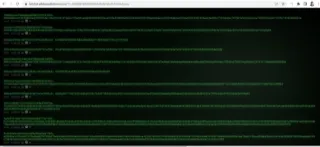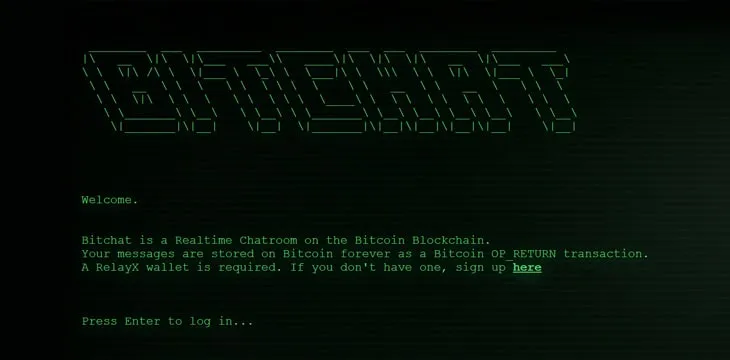|
Getting your Trinity Audio player ready...
|
Over a weekend in September 2022, CEO of TonicPow Luke Rohenaz launched Bitchat, a real-time chatroom over Bitcoin SV. Bitchat is a revival of an _unwriter application launched in early 2019.
[6]
Today I introduce Bitchat, a Massively Multiplayer Global Realtime Chat over Bitcoin.
All messages are OP_RETURN transactions. But what's unique is: It's FREE. No need to pay or think about wallets.
Come chat now:https://t.co/RFv57c1CFr
— _unwriter (@_unwriter) January 19, 2019
Users can start chatting on-chain for nearly free, thanks to the cratering fee rates on BSV.

The fee to post the above message cost only 20 satoshis, meaning that 1 penny worth of BSV (~20,000 satoshis) would pay for approximately 1,000 messages at current fee rates. As the fees get lower, more and more applications will look to put various kinds of data on the blockchain.
This time, Bitchat relies on more robust infrastructure and protocols, such as the imminent JungleBus API, and Bitcoin Schema protocols. As queries are made via JungleBus to only fetch transactions that implement the Bitcoin Social protocols, even messages made from Twetch and Blockpost show up, even though they were created on different domains.
The chat messages themselves follow open protocols, so other developers can easily implement chat rooms, write their own APIs, and build applications with the same data. For example, hours after the launch, I was able to slightly adjust some code I was already working on to post to Bitchat with my HandCash wallet in just 5 minutes:
👀 @wildsatchmo @brandonbryant02 @danwag06 pic.twitter.com/3aHJCR5Pw7
— shua (@cryptoAcorns) September 18, 2022
Additionally, it appears that someone has already created an encrypted on-chain chat room only hours after the launch as well.

This quick, iterative innovation is made possible by an open ledger, lack of permission and microscopic fees. The transactions and protocols existing on the public ledger allow developers to quickly learn how data is formatted, while the lack of permission lets them hit the ground running without having to obtain authentication credentials before starting. Low fees allow for experimentation, as the cost is very low for any mistakes made.
Furthermore, the chat is censorship-resistant at the protocol layer. Applications or nodes could censor or prune transactions as they wish, but the users will always have an immutable record of their transaction and message.
At launch, Bitchat does not implement any authentication in the data being put on-chain, so theoretically users and paymails could be spoofed. Regardless, as the chat is used more it will justify implementation of more secure controls. Also, for now, only the last 50 or so messages are displayed. The beauty of these issues is that they provide opportunity for anyone else to make their own version and try to create a network effect themselves.
As far as monetization, Bitchat is currently nearly free (users only pay the network fee) which would allow the platform to take a cut for each message that users would likely never notice. If the platform fee was 100 satoshis, a penny would still pay for over 150 messages. With added features with capabilities to earn such as likes or tips, even if they do notice the fee they may not care as they can potentially offset the cost.
In conclusion Bitchat shows (not tells) the benefits of building and using applications on top of Bitcoin SV. With such permissionless innovation and profit opportunity, businesses can demonstrate the true value proposition of the BSV network.
Watch: BSV Global Blockchain Convention presentation, Making Blockchain Easy for Real World Use

 07-08-2025
07-08-2025 





